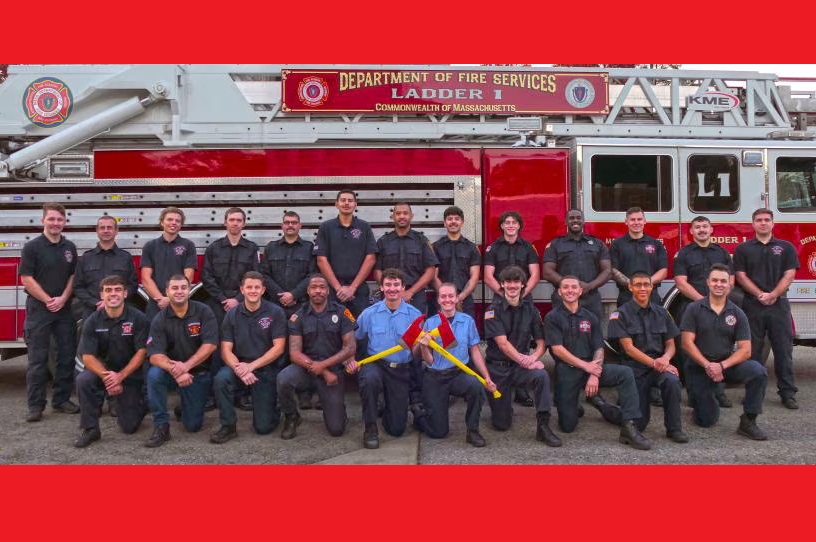Community
22 local firefighters from 11 communities graduate from State Fire Academy in Fall River ceremony

FALL RIVER — State Fire Marshal Jon M. Davine announced the graduation of 22 recruits from the Massachusetts Firefighting Academy’s Call/Volunteer Recruit Firefighter Training Program Tuesday evening. The graduates received certificates of completion at a ceremony at Matthew J. Kuss Middle School in Fall River.
The graduating firefighters of Call/Volunteer Recruit Class #115 represent the fire departments of Avon, Berkley, Dartmouth Fire District 1, Dartmouth Fire District 2, Dartmouth Fire District 3, Dighton, Freetown, Kingston, Lincoln, Plympton, and Swansea.
“Massachusetts firefighters are on the frontlines protecting their communities every day, and today’s graduates are needed now more than ever,” said State Fire Marshal Davine. “The hundreds of hours of foundational training they’ve received will provide them with the physical, mental, and technical skills to perform their jobs effectively and safely.”
“Massachusetts Firefighting Academy instructors draw on decades of experience in the fire service to train new recruits,” said MFA Deputy Director of Training Dennis A. Ball. “Through consistent classroom instruction and practical exercises, tonight’s graduates have developed the tools they’ll need to protect their communities.”
The Martin H. McNamara Outstanding Student Award was presented to Firefighter Shayne Redmond of the Plympton Fire Department. The award is named for Martin “Marty” McNamara V, a call firefighter with the Lancaster Fire Department who lost his life in the line of duty in 2003 while battling a fire in a multifamily home. It is presented to one recruit in each graduating call/volunteer training class and recognizes their academic and practical skills, testing, and evaluations over the course of the program.
Video of the ceremony will be posted Wednesday at the Department of Fire Services’ YouTube channel, www.youtube.com/dfsosfm.
The Call/Volunteer Firefighter Recruit Training Program is unique in that it delivers a standard recruit training curriculum, meeting national standards, on nights and weekends to accommodate the schedule of firefighters in suburban and rural areas. Making the training more accessible means more firefighters can participate and allows them more time to practice training skills with instructors.
The MFA, a division of the Department of Fire Services, has offered the program since 2003. More than 3,000 call and volunteer recruits have graduated since then.
Today’s firefighters train for all types of hazards and emergencies. They are the first ones called to chemical and environmental emergencies, ranging from the suspected presence of carbon monoxide to Fentanyl overdoses or a gas leak. They may be called to rescue children who have fallen through the ice or locked themselves in a bathroom. They rescue people from stalled elevators and crashed vehicles. They must test, maintain, and utilize equipment such as self-contained breathing apparatus (SCBA), hydrants, hoses, power tools, and apparatus.
At the Massachusetts Firefighting Academy, they learn all these skills and more, including the latest science of fire behavior and suppression tactics, from certified fire instructors. They also receive training in public fire education, hazardous material incident mitigation, flammable liquids, stress management, and self-rescue techniques. The intensive program involves classroom instruction, physical fitness training, firefighter skills training, and live firefighting practice.
Students receive classroom training in all basic firefighter skills. They practice first under non-fire conditions and then during controlled fire conditions. To graduate, students must demonstrate proficiency in life safety, search and rescue, ladder operations, water supply, pump operation, and fire attack. Fire attack operations range from mailbox fires to multiple-floor or multiple room structural fires.
Graduates have completed 240 hours of training on nights and weekends. Upon successful completion of this program, all students have met the national standards of NFPA 1001, Standard for Fire Fighter Professional Qualifications. In addition, they have the ability to become certified to the level of Firefighter I/II and Hazardous Materials First Responder Operations Level by the Massachusetts Fire Training Council, which is accredited by the National Board on Fire Service Professional Qualifications.






